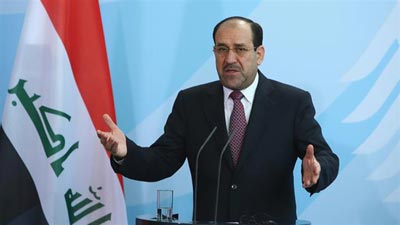| « CIA Working to Replace Venezuelan Democracy with Fascist Tyranny | The American System in Healthcare: The Path to Medicare » |
Iraqi Vice President in Moscow
Stephen Lendman (stephenlendman.org (Home - Stephen Lendman)
Iraqi Vice President Nouri al-Maliki served as prime minister from 2006 to 2014.
Washington forced him out for not being subservient enough to US interests. Haider al-Abadi replaced him.
Weeks later, Maliki became one of three Iraqi vice presidents. He holds the post despite efforts to abolish it.
In late 2014, he accused Washington of using ISIS as a pretext to maintain a military presence in Iraq, saying:
“The Americans began this sedition in Syria and then expanded its dimensions into Iraq and it seems that they intend to further stretch this problem to other countries in their future plans.”
Days earlier, he accused Washington of involvement in creating ISIS, saying:
“IS resembles the Taliban which was created by the US administration to counter the USSR in Afghanistan.”
“The same way, IS was created to counter the Iraqi stance, which did not agree to blockade Syria, was against no-fly zones in Syria, and against American military bases” in Iraq.
“The Iraqi society is against foreign military bases on the country’s territory.” He opposes US forces “coming back to Iraq and setting up bases here.”
The Trump administration has other regional ideas. CENTCOM commander General Joseph Votel said US forces will remain in Syria after the battle for Raqqa is over – on the phony pretext of stabilizing the region.
Operation Inherent Resolve commander General Stephen Townsend said “(t)he Iraqi government has expressed an interest in having the US forces and coalition forces remain after the defeat of ISIS. Our government is equally interested in that.”
Trump wants congressional funding for US military bases in Iraq and Syria.
On July 12, a White House policy statement on the FY 2018 National Defense Authorization Act expressed concern about lack of “additional requested authority for small-scale construction of temporary facilities that are necessary to meet operational needs and force protection requirements in both Iraq and Syria” – code language for intended US occupation of both countries.
Claiming funds are needed to continue combating ISIS conceals US support for all terrorists operating in both countries and others.
After meeting with Russia’s upper house Federation Council Speaker Valentina Matvienko on Monday, Maliki said “(i)t is known that Russia has historically strong relations with Iraq.”
“So, we would like Russia to have a substantial presence in our country, politically and militarily. This way, a balance would be established that would benefit the region, its peoples and its countries.”
He discussed greater Russian involvement with Sergey Lavrov to prevent a “foreign political entity” (aka Washington) from imposing its will on Iraq.
Baghdad had good relations with Moscow throughout the Cold War period. Maliki wants it restored, leery of America’s regional aims. He opposes a US military presence in his country.
Days earlier, Iraq’s Defense Minister General Erfan al-Hiyali signed a military cooperation agreement with his Iranian counterpart General Hossein Dehqan in Tehran.
It involves “expansion of cooperation and sharing experiences in the fields of fight against terrorism and extremism, border security, training, logistics, technical and military supports…”
Baghdad seeks closer ties to Iran, Syria and Russia, wanting the country distancing itself from Washington and Ankara.
The Pentagon has many military bases in Iraq, some close to Iran’s border. It won’t give them up easily.
Maliki seeks Russian involvement in Iraq for greater regional balance to prevent “any external party” from undermining it.
He seeks cooperation with Moscow “in the energy field. (W)hen we are done with the Islamic State, Iraq needs investments in energy and trade,” he said.
He seeks help from Russia in combating regional terrorism Washington and its rogue allies support.
Longstanding US policy calls for regime change in Damascus and Tehran, likely Iraq as well if it pursues policies Maliki advocates.
-###-
Stephen Lendman lives in Chicago. He can be reached at lendmanstephen@sbcglobal.net.
VISIT MY NEW WEB SITE: stephenlendman.org (Home - Stephen Lendman)
My newest book as editor and contributor is titled "Flashpoint in Ukraine: How the US Drive for Hegemony Risks WW III."



